
La Cenerentola, ossia La bontà in trionfo is an operatic dramma giocoso in two acts by Gioachino Rossini. The libretto was written by Jacopo Ferretti, based on the libretti written by Charles-Guillaume Étienne for the opera Cendrillon with music by Nicolas Isouard and by Francesco Fiorini for Agatina, o la virtù premiata with music by Stefano Pavesi. All these operas are versions of the fairy tale Cendrillon by Charles Perrault. Rossini's opera was first performed in Rome's Teatro Valle on 25 January 1817.

Il matrimonio segreto is a dramma giocoso in two acts, music by Domenico Cimarosa, on a libretto by Giovanni Bertati, based on the 1766 play The Clandestine Marriage by George Colman the Elder and David Garrick. It was first performed on 7 February 1792 at the Imperial Hofburg Theatre in Vienna in the presence of Emperor Leopold II.
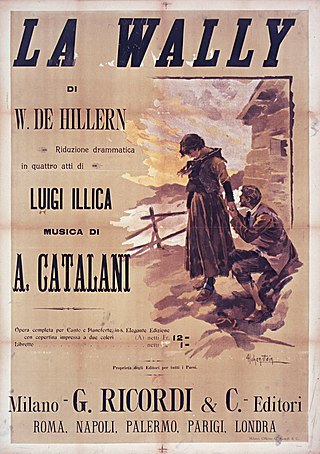
La Wally is an opera in four acts by composer Alfredo Catalani, to a libretto by Luigi Illica, first performed at La Scala, Milan, on 20 January 1892. It was Catalani's last opera.

Oberto, Conte di San Bonifacio is an opera in two acts by Giuseppe Verdi to an Italian libretto by Temistocle Solera, based on an existing libretto by Antonio Piazza probably called Rocester.
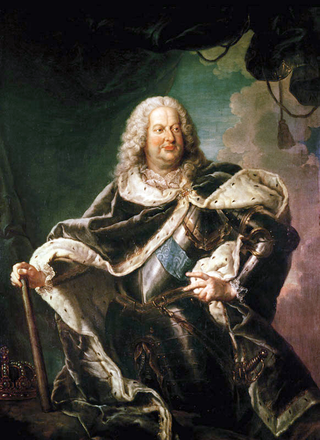
Un giorno di regno, ossia Il finto Stanislao is an operatic melodramma giocoso in two acts by Giuseppe Verdi to an Italian libretto written in 1818 by Felice Romani. Originally written for the Bohemian composer Adalbert Gyrowetz the libretto was based on the play Le faux Stanislas written by the Frenchman Alexandre-Vincent Pineux Duval in 1808. Un giorno was given its premiere performance at the Teatro alla Scala, Milan on 5 September 1840.

Luisa Miller is an opera in three acts by Giuseppe Verdi to an Italian libretto by Salvadore Cammarano, based on the play Kabale und Liebe by the German dramatist Friedrich von Schiller.

Fedora is an opera in three acts by Umberto Giordano to an Italian libretto by Arturo Colautti, based on the 1882 play Fédora by Victorien Sardou. Along with Andrea Chénier and Siberia, it is one of the most notable works of Giordano.

Stiffelio is an opera in three acts by Giuseppe Verdi, from an Italian libretto by Francesco Maria Piave. The origin of this was the novel Le pasteur d’hommes, by Émile Souvestre, which was published in 1838. This was adapted into the French play Le pasteur, ou L'évangile et le foyer by Souvestre together with Eugène Bourgeois. That play was in turn translated into Italian by Gaetano Vestri as Stifellius; this formed the basis of Piave's libretto.

Alzira is an opera in a prologue and two acts by Giuseppe Verdi to an Italian libretto by Salvatore Cammarano, based on the 1736 play Alzire, ou les Américains by Voltaire.
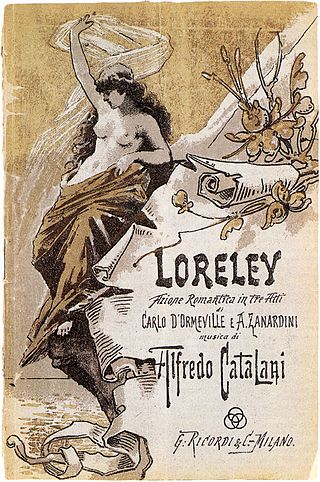
Loreley is an opera in three acts composed by Alfredo Catalani to a libretto by Angelo Zanardini, Carlo D'Ormeville and others. It premiered on 16 February 1890 at the Teatro Regio in Turin. Based on the German legend of the Lorelei, the opera is an extensive reworking of Catalani's four-act opera Elda which had premiered in Turin ten years earlier.
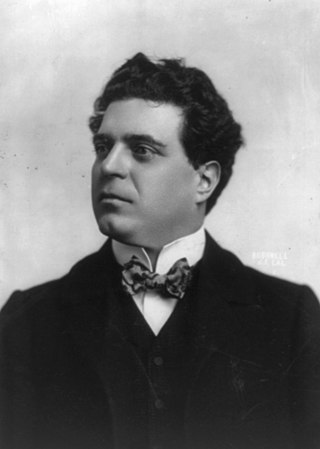
L'amico Fritz is an opera in three acts by Pietro Mascagni, premiered in 1891 from a libretto by P. Suardon, based on the French novel L'ami Fritz by Émile Erckmann and Pierre-Alexandre Chatrian.

Carlo di Borgogna is an Italian opera in three parts composed by Giovanni Pacini to a libretto by Gaetano Rossi. It was first performed at the Teatro la Fenice, Venice, on 21 February 1835.

Enrico di Borgogna is an opera eroica or "heroic" opera in two acts by Gaetano Donizetti. Bartolomeo Merelli, wrote the Italian libretto based on Der Graf von Burgund by August von Kotzebue.

Jérusalem is a grand opera in four acts by Giuseppe Verdi. The libretto was to be an adaptation and partial translation of the composer's original 1843 Italian opera, I Lombardi alla prima crociata. It was the one opera which he regarded as the most suitable for being translated into French and, taking Eugène Scribe's advice, Verdi agreed that a French libretto was to be prepared by Alphonse Royer and Gustave Vaëz, who had written the libretto for Donizetti's most successful French opera, La favorite. The opera received its premiere performance at the Salle Le Peletier in Paris on 26 November 1847. The maiden production was designed by Paul Lormier (costumes), Charles Séchan, Jules Diéterle and Édouard Desplechin, and Charles-Antoine Cambon and Joseph Thierry.

Faust is an opera by the German composer Louis Spohr. The libretto, by Joseph Karl Bernard, is based on the legend of Faust; it is not influenced by Goethe's Faust, though Faust, Part One had been published in 1808. Instead, Bernard's libretto draws mainly on Faust plays and poems by Friedrich Maximilian Klinger and Heinrich von Kleist. Spohr's Faust is an important work in the history of German Romantic opera.

Giovanni Paroli (1856–1920) was an Italian operatic tenor who had an active international performance career for four decades. He is best known for creating several comprimario roles in the world premieres of operas by Catalani, Donizetti, Alberto Franchetti, Mascagni, and Verdi.
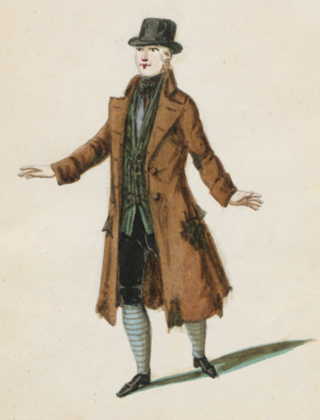
Don Checco is an opera in two acts composed by Nicola De Giosa to a libretto by Almerindo Spadetta. It premiered on 11 July 1850 at the Teatro Nuovo in Naples. Don Checco was De Giosa's masterpiece and one of the last great successes in the history of Neapolitan opera buffa.

Mala vita is an opera in three acts composed by Umberto Giordano to a libretto by Nicola Daspuro adapted from Salvatore Di Giacomo and Goffredo Cognetti's verismo play of the same name. Giordano's first full-length opera, Mala vita premiered on 21 February 1892 at the Teatro Argentina. It was subsequently performed in Naples, Vienna, Berlin and Milan, and various Italian cities over the next two years. In 1897 a considerably re-worked and revised version under the title Il voto premiered in Milan. Within a few years, both versions had disappeared from the repertoire. Amongst its rare modern revivals was the 2002 performance at the Teatro Umberto Giordano in Foggia which was recorded live and released on the Bongiovanni label.
Rigoletto in a 1982 Italian opera film directed by Jean-Pierre Ponnelle and starring Ingvar Wixell, Edita Gruberová and Luciano Pavarotti, with the music score conducted by Riccardo Chailly. The film is based upon the 1851 opera of the same name by Giuseppe Verdi to a libretto by Francesco Maria Piave.

Virginia Ferni Germano was an Italian lyric soprano opera singer.



















